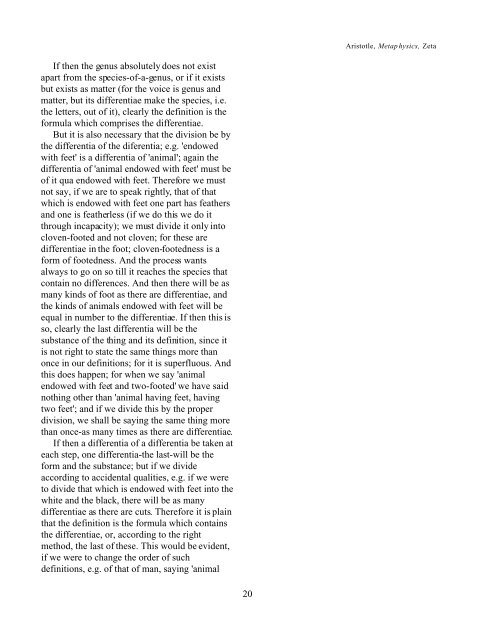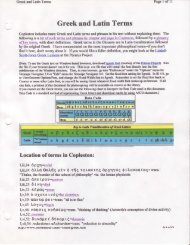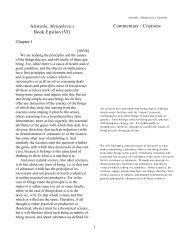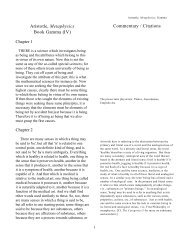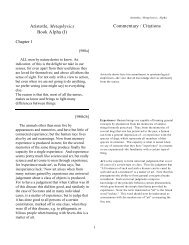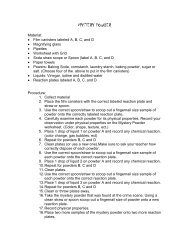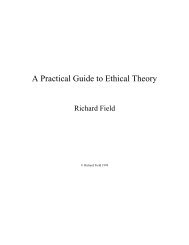Aristotle, Metaphysics Book Zeta (VII) Commentary ... - CATpages
Aristotle, Metaphysics Book Zeta (VII) Commentary ... - CATpages
Aristotle, Metaphysics Book Zeta (VII) Commentary ... - CATpages
Create successful ePaper yourself
Turn your PDF publications into a flip-book with our unique Google optimized e-Paper software.
<strong>Aristotle</strong>, <strong>Metaphysics</strong>, <strong>Zeta</strong><br />
If then the genus absolutely does not exist<br />
apart from the species-of-a-genus, or if it exists<br />
but exists as matter (for the voice is genus and<br />
matter, but its differentiae make the species, i.e.<br />
the letters, out of it), clearly the definition is the<br />
formula which comprises the differentiae.<br />
But it is also necessary that the division be by<br />
the differentia of the diferentia; e.g. 'endowed<br />
with feet' is a differentia of 'animal'; again the<br />
differentia of 'animal endowed with feet' must be<br />
of it qua endowed with feet. Therefore we must<br />
not say, if we are to speak rightly, that of that<br />
which is endowed with feet one part has feathers<br />
and one is featherless (if we do this we do it<br />
through incapacity); we must divide it only into<br />
cloven-footed and not cloven; for these are<br />
differentiae in the foot; cloven-footedness is a<br />
form of footedness. And the process wants<br />
always to go on so till it reaches the species that<br />
contain no differences. And then there will be as<br />
many kinds of foot as there are differentiae, and<br />
the kinds of animals endowed with feet will be<br />
equal in number to the differentiae. If then this is<br />
so, clearly the last differentia will be the<br />
substance of the thing and its definition, since it<br />
is not right to state the same things more than<br />
once in our definitions; for it is superfluous. And<br />
this does happen; for when we say 'animal<br />
endowed with feet and two-footed' we have said<br />
nothing other than 'animal having feet, having<br />
two feet'; and if we divide this by the proper<br />
division, we shall be saying the same thing more<br />
than once-as many times as there are differentiae.<br />
If then a differentia of a differentia be taken at<br />
each step, one differentia-the last-will be the<br />
form and the substance; but if we divide<br />
according to accidental qualities, e.g. if we were<br />
to divide that which is endowed with feet into the<br />
white and the black, there will be as many<br />
differentiae as there are cuts. Therefore it is plain<br />
that the definition is the formula which contains<br />
the differentiae, or, according to the right<br />
method, the last of these. This would be evident,<br />
if we were to change the order of such<br />
definitions, e.g. of that of man, saying 'animal<br />
20


